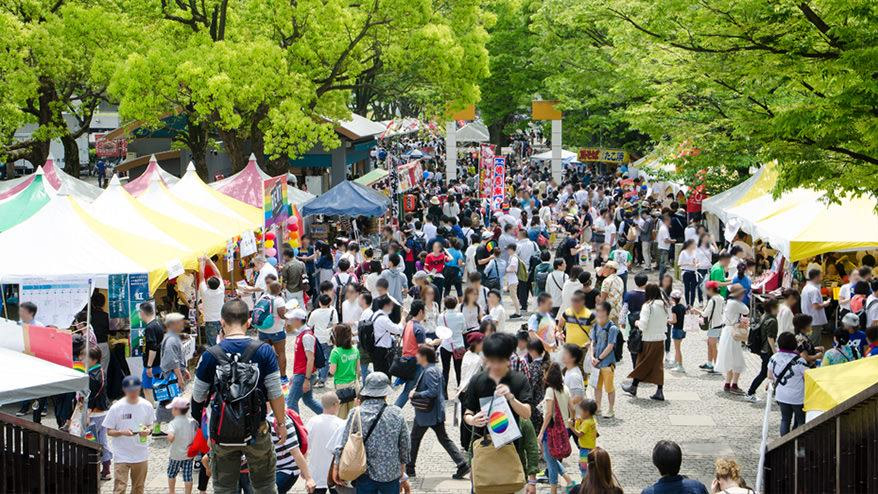Hello. This is Inui from the Quality Control Department.
Following on from the last one, this is the second interview conducted at Tokyo Rainbow Pride 2017, held in May.
This time I would like to introduce an interview with Ponzu-kun and Non-san, a couple who are my friends and whom I met at Prism.
I met the two of them at Hosei University's LGBT circle "Prism", which I introduced last time .
Ponzu-kun was one of the original members of Prism when it was first established. Non-san joined Prism when she was in high school after meeting the company's CEO, Ochazuke-san, on social media.
Ponzu-kun and I are the same age, and Non-san is three years younger. We became good friends because we have common hobbies.
In the club, we often talked about our problems, but what stood out in particular was the troubles we had about love.
We would chat and giggle about how cute she was or how she liked the guy.
Many people spoke about the things that happen and the feelings that arise as a minority, such as "it's harder to fall in love than for cis-heterosexual people*1," "even when I've found someone I like, it's never been reciprocated," and "I feel disgusted by the idea of falling in love," and many also worried about their own sexuality.
*1 Cishetero is a term that combines "cisgender," a person whose gender identity matches the sex they were born with and lives their life accordingly, and "heterosexual," a person who is heterosexual.
This refers to when a person's physical sex and gender identity is male and they are attracted to women, or when their physical sex and gender identity is female and they are attracted to men.
I think there will be more and more difficulties in relationships, but it's nice to see couples who find their partner and build a good relationship even in such circumstances.
Ponzu-kun and Non-san are one of the close couples I know well.
They've been dating for six months and although they do fight sometimes, it's clear that they respect and trust each other.
How do they feel about the people around them and society?
We asked her about what she noticed and what worries she had since they started dating.
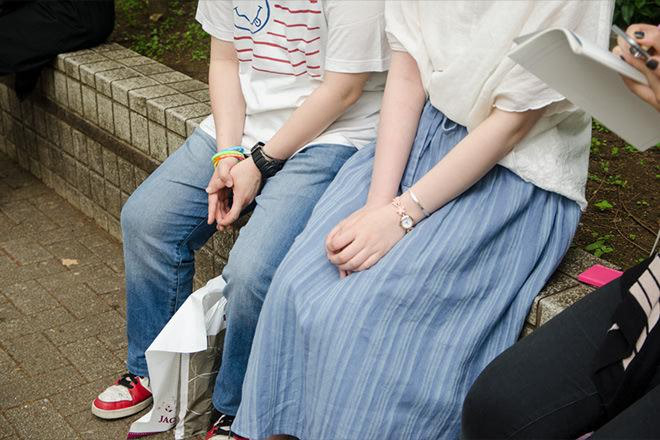
Non is in the front of the photo. Ponzu is in the back. They said that their outfits that day ended up looking like matching outfits without them even realizing it. Just like a real couple.
- First, please introduce yourself.
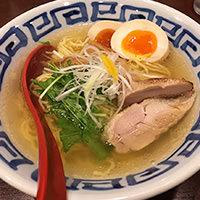 Ponzu-kun
Ponzu-kunI'm a part-time worker now, having graduated from university. I'm planning to take the medical school entrance exam next spring, and I'm attending a preparatory school. My sexuality is FtM*2.
Abbreviation for Female to Male. A person who is born female but has a male gender identity. A person who is born male and has a female gender identity is called MtF (Male to Female).
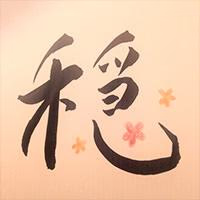 Nonsan
NonsanI'm a second year university student. I'm studying LGBTs and psychology. I can't generalize about my sexuality, but I consider myself pansexual*3.
It refers to people who are pansexual and do not care about sexuality, regardless of gender. In Non's case, she places particular importance on spiritual connections, regardless of sexuality.
- How long have you two been dating?
 Nonsan
NonsanIt started last November.
 Ponzu-kun
Ponzu-kunWe met at Prism and started dating six months later.
I didn't think I'd be able to date anyone or find someone who would accept me as transgender.
- How do you introduce each other to people around you?
 Nonsan
NonsanI brag to my friends that I have a boyfriend who is FtM. He's unconventional, but I'm happy, and I've told all my family except my dad.
Everyone listened to me carefully, didn't make it seem special, and just said things like "I'm glad you've got a boyfriend."
In our brothers' LINE group, we also send stories and photos of fights we've had with Ponzu-kun.
 Ponzu-kun
Ponzu-kunCome to think of it, I met Non's mother when she came to Tokyo.
- What! It's not often that you get to meet your mother, so what was her reaction?
 Ponzu-kun
Ponzu-kunThey accepted it normally.
 Nonsan
NonsanEvery time I went home, I would talk about Ponzu-kun, and my mother wanted to meet him.
- You have a great relationship. Is there a reason why you didn't tell your father?
 Nonsan
NonsanWhen I was in high school, I tried to find out from my dad what he thought about homosexuals, but he made some discriminatory remarks...
I wonder if my thoughts haven't changed even now.
Even though he's my boyfriend, I have a girl's body, so I don't want him to say anything, and I feel bad about making him hear it, so I haven't told my dad yet.
- I see. How about your friends?
 Nonsan
NonsanI was like, "Wow! Congratulations!" (laughs).
I'm grateful that people around me have responded positively to it.
- That's good to hear. Have you told your family or friends, Ponzu-kun?
 Ponzu-kun
Ponzu-kunI have come out to my whole family, but I have only told my mother that I have a girlfriend.
But I just kind of let it go and thought, "Oh, I see."
I think that rather than a question of who she's dating, she just hasn't yet accepted the fact that her child is transgender.I've told my friends, people who know I'm transgender, and they've accepted me. I'm accepted by the people around me, but maybe not as much as Non.
 Nonsan
NonsanI think the people around me are the ones who are more accepting of them, so I think the reaction of Ponzu-kun's people is more typical. Neither of them are rejected by the people around them, so there's no need to be told to be more accepting.
- I see. Is there anything in particular that you find difficult in your daily life?
 Nonsan
NonsanThat's true. However, I had some worries when it came to introducing it to people around me.
No matter how accepting my family and friends may seem, I was worried that while a heterosexual person might easily say, "I have a boyfriend or girlfriend," when I introduced Ponzu-kun to them they might wonder, "What gender is he?" or that they would have the strong impression that I was a child with gender identity disorder rather than seeing me as a person.Since then, I've felt aversion towards sex and have been telling people around me that I might be asexual*4.
Yet, I find it painful when people ask me things like, "Why did you choose someone who doesn't have any sexual aversion to you as your boyfriend?" and associate dating with sex.
A person who is asexual. This refers to someone who has romantic feelings for others but has no sexual desire for them.
 Ponzu-kun
Ponzu-kunIt's easy for me to tell people who are out, but it's hard to tell people who aren't out because they respond with things like, "How can a girl have a girlfriend?" or they sometimes mistake me for a lesbian, and it confuses them.
Not just about Non's introduction, but about my sexuality or coming out in general, I find it difficult to tell people I don't trust. Other than that, I don't have many problems in my daily life.
 Nonsan
NonsanWhen we're riding the train together, people often offer up their seats for us and we look at each other with big smiles on our faces, so I think they think we're a normal couple.
- Is there anything that doesn't usually happen, but that you don't like being treated in a certain way?
 Ponzu-kun
Ponzu-kunWhen we went to Hokkaido together, I made the hotel reservation using my real name, so I was given a cute pink yukata...
I was a little confused, but I realized it couldn't be helped since I didn't know.I don't like it when people say things to me so blatantly, but since there are more people who don't know their own sexuality, I think there are times when I have to put up with it to a certain extent.
 Nonsan
NonsanI saw people on the internet saying that they were given unpleasant looks, so at first I was very wary, but in reality that wasn't the case. Many of the couples I know seem to be happy.
The manager at the store where I work part-time also told me, "If you have a FtM boyfriend, people around you might say something," but I think it's fine to treat us as a normal couple.
Sometimes I find myself wondering if Ponzu-kun is actually a girl on family register and if we will ever get married, but I just feel like I'm dating a normal boy.
 Ponzu-kun
Ponzu-kunBecause the two of them are normal.
- It seems like people around you may be being too considerate. Are there any advantages to being together as a minority?
 Ponzu-kun
Ponzu-kunThey understand my concerns without me having to explain them in detail, and we can get things done quickly.
 Nonsan
NonsanWe can also have serious conversations.
Even if the topic has nothing to do with sexuality, there are times when I'm like, "It's okay to talk to Ponzu about this."
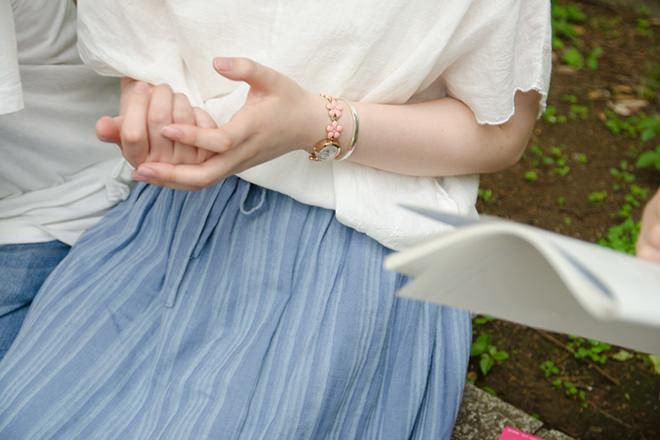
Changing expectations for society and the gap that still remains
- For both Ponzu-kun and Non, today is your second time participating in Tokyo Rainbow Pride, following on from last year. Is there anything you're looking forward to or any booths you're hoping to see?
 Nonsan
NonsanIt just came to me rather than me being looking forward to anything specific.
Looking at the overall atmosphere, it feels like this year is really exciting.
 Ponzu-kun
Ponzu-kunIt's also been featured on television, and I feel like things have changed in the last few years.
- How long have you been feeling the change?
 Ponzu-kun
Ponzu-kunThat would have been unthinkable two or three years ago.
The other day I saw on the news that there was an LGBT event this weekend, and I was impressed by how it was covered as if it were a regular news item.
It feels like things that were previously considered taboo in society are now being removed.
When I became a university student, I thought I would never be able to find a job, but now I can see hope.
 Nonsan
NonsanI feel like people are trying to get to know each other these days.
When I was talking about LGBT with a friend, he said, "There are parades in Yoyogi Park, aren't there?" It was the first reaction I'd ever had, so I was happy.
- Where are you from, Non-san? Are there no events like this in your local area?
 Nonsan
NonsanIt's Wakayama.
Even in big cities like Sapporo and Osaka, there are very few.
In some areas, the prejudice is so bad that it's almost difficult to breathe.Even if you try to meet people from the same sex minority, they are only found in big cities, so students in rural areas may find it difficult to make friends. That was the case for me.
I decided to go to Tokyo because my homeroom teacher encouraged me, saying it would be an easy place to study LGBT issues, and I had met people there on social media, so I felt like I had a place to belong and that everything would be okay.
- The environment around you plays a big role. Did you always consult with friends?
 Nonsan
NonsanWhen I was in my second year of high school, I was worried that maybe I was falling in love with a girl, so I came out to my closest friend, and then to my mother.
I also tell my close friends at university.
I think people think, "This guy falls in love with girls too," and they probably don't even pay him any attention.
 Ponzu-kun
Ponzu-kunI didn't tell anyone, and I didn't want to tell anyone.
I hated living as a woman and couldn't accept my sexuality.
I didn't want to think of myself as transgender, but after I started going to a gender clinic*5, I was able to come to terms with myself.
Gradually I began to understand what I wanted to become, and I joined a club because I wanted to interact with more different people.
*5 Gender Clinics are primarily used for diagnosis and counseling of gender identity disorder. If you wish to change your name, you must have a medical certificate. Also, if you wish to change your family register, you must undergo gender reassignment surgery, which is not covered by insurance and is therefore a heavy financial burden.
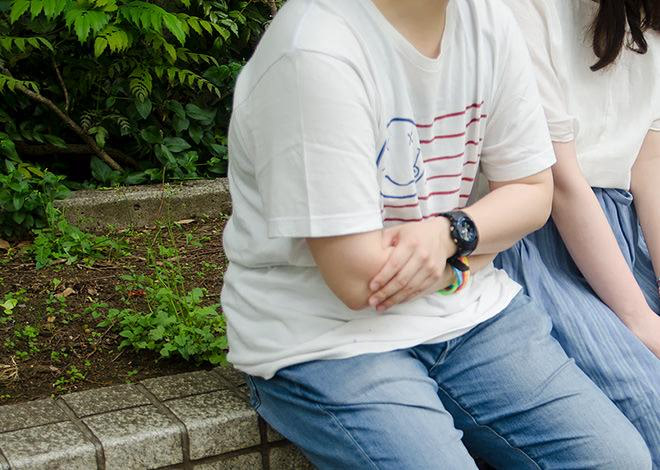
- Are there any people you would like to talk to about it, or people you wouldn't want to tell?
 Nonsan
NonsanI would never say this to someone who makes phobic*6 remarks, and I don't want to say it to people who are prejudiced against people with disabilities or who attack minorities of any kind.
In recent years, it is often used to mean dislike (British word phobia). Negative values can sometimes lead to discrimination and violence.
- Have you ever been told something like that?
 Ponzu-kun
Ponzu-kunThere aren't many people who directly make discriminatory remarks, but there are people who make them into jokes.
 Nonsan
NonsanMe too. But I had teachers say things like "You two are so close, are you gay?" or "You're a transvestite" all through elementary, middle, and high school.
 Ponzu-kun
Ponzu-kunRecently, teachers have been taking courses from NPOs and it seems they are also trying to change.
 Nonsan
NonsanI believe that if the educational field changes, society as a whole will change.
-What do you think regular companies can do?
 Ponzu-kun
Ponzu-kunWhen I ask for something, I have trouble knowing how far I can go and where it becomes selfish.
When I was looking for a part-time job, I told them that I wanted to wear a man's uniform and work under an alias, and the store manager understood, but headquarters did not give permission.
There are many countries overseas that have advanced systems in place, so I hope Japanese companies will also do their best.
 Nonsan
NonsanIt seems that LGBT issues are increasingly being covered in company training, but this can sometimes make it difficult for people who are in the closet*7 to be there.
Some people think it's easier because they won't be recognized, and although we're all lumped together as "LGBT," everyone feels differently, so I think it's difficult...
Hiding your own sexuality.
 Ponzu-kun
Ponzu-kunWhen I was interviewed by a company, we talked about whether it was okay to treat LGBT people differently. I suggested that, rather than treating LGBT people differently, we should treat them as just one of many attributes, such as race or religion.
Also, since it was a venture company, they didn't have a system for when they got married yet. So I suggested that they should introduce both heterosexual and same-sex marriage systems. I hope it will be an opportunity to think about the problems that everyone has at the same time.
- It seems like there are lots of different ways to do this. Today is the last day of Tokyo Rainbow Pride, but do you ever feel a gap between the excitement of the event and your everyday life?
 Nonsan
NonsanIt was great last year!
I had just moved to Tokyo last year, and met a lot of LGBT people.
I thought I was surrounded by sexual minorities, but when I returned to school I really felt that I was a minority after all.
 Ponzu-kun
Ponzu-kunWhen I leave the venue, it feels like the world is just as usual.
Yoyogi Park feels like another world and it makes me sad.
- I see. Is there anything like this that you would like to see become a part of your daily life?
 Nonsan
NonsanRather than asking for any specific action, I would like people to be more mindful of their awareness and words.
 Ponzu-kun
Ponzu-kunI think Japan is particularly harsh towards minorities, for example by prohibiting people from working if they have a disability.
I believe that if we respect and accept each person's individuality, regardless of their sexuality, we can create a society where everyone can live comfortably.
Accept yourself and others
During the interview, Ponzu said that he was "starting to be accepted by society," and I think that was because he himself had come to accept himself.
I learned from him that if you honestly accept your current situation, think about what you want to do, and then take action, the path will open up naturally. Good luck with your exams!
I also really respect how Non sees things in a positive way and lives her life being grateful to the people around her.
I was shocked when she said, "I wonder if I'll ever get married."
The shock is not that she can't be happy because she can't get married, but that she can't do the things that cis-hetero people can do if they want to.
I feel that not only marriage but all social systems are based on the premise that people are heterosexual.
Currently in Japan, there are no legal guarantees for same-sex relationships.
Apparently, even partners may be refused visitation at hospitals, or not be allowed to sit in the family section at funerals.
At the launch press conference of the League of LGBT Local Government Councilors, which was established on July 6th, Tokyo Bunkyo Ward Councilor Maeda Kunihiro publicly announced that he is gay.
Maeda herself lost her partner 15 years ago, and says that she suffered a lot due to the lack of systems and social understanding.
"LGBT people exist in every generation and every region. I want to create mechanisms and systems that support them so that they do not become isolated from society," he said.*
He says the reason he has not been able to make it public during his 18 years as a member of parliament is because he was scared, but he also says that his supporters have told him, "I want you to avoid anything that would put you at risk for being elected."
Still, I think it's great that he had the courage to go public with his desire to "change society."
There has been an increase in news coverage about LGBT and awareness of the term has spread, which may be why some people say, "The number of LGBT people has increased."
It may seem that way because they have been made visible, but we just didn't know they existed; their numbers aren't increasing or decreasing.
There is said to be an LGBT boom, but we need to think about how it will affect our lives beyond this rather than letting it just be a fad.
Even if we can't do something big enough to change society, there must be things we can do in our daily lives. I think one of those things is "acceptance." If we can accept the people around us, the situation, and what we want, I think little by little changes will occur.
This is a versatile skill that can be used not only in LGBT matters, but also in everything, including work and relationships.
I would encourage everyone to give it a try.
*Quoted from Tokyo Shimbun, July 7, 2017. "I want to change society" by disclosing my homosexuality, says LGBT local assembly member http://www.tokyo-np.co.jp/article/national/list/201707/CK2017070702000245.html
